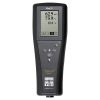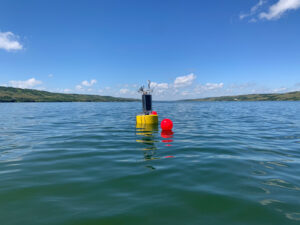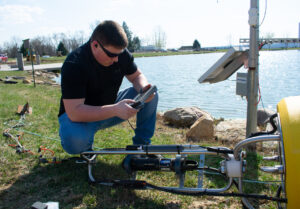Thermo Orion Star A123 Portable Dissolved Oxygen Meter
Features
- Compatible with Orion polarographic DO sensors with 9-pin mini-DIN connectors
- AUTO-READ function alerts user and locks on-screen readings when stable
- IP67 waterproof rating, 3-year warranty
- Free ground shipping
- Expedited repair and warranty service
- Lifetime technical support
- More
The waterproof, battery-operated Thermo Orion Star A123 portable DO meter stands up to the most demanding field applications and delivers over 2,000 hours of continuous operation. Multiple calibration options, automatic temperature compensation, and manual salinity and barometric pressure compensation make the A123 user-friendly and accurate.
The rugged, user-friendly meter displays DO concentration, DO saturation and temperature readings on a large LCD screen, while icons provide quick updates on battery life, electrode status and calibration information. Simple button layout and on-screen messages assist with calibration and explain setup menu choices.
- AUTO-READ function alerts user and locks on-screen readings when stable
- Calibration with either water-saturated air method or Winkler titration
- Accepts Orion polarographic DO probes
- Non-volatile memory holds up to 50 data points
- Universal power supply or battery power option
- IP67-rated housing
- 3 year meter warranty
- Dissolved Oxygen Concentration (% Sat)
- Range: 0 to 20 mg/L (0 to 200 %)
- Resolution: 0.1, 0.01 (0.1,1)
- Relative Accuracy: +/-0.2 (+/-2 %)
- Manual Barometric Pressure Compensation: 450.0 to 850.0 mm Hg
- Manual Salinity Factor Correction: 0 to 45 ppt
- Calibration Features: Water-saturated air, manual (Winkler)
- Sensor type: Polarographic
- Temperature
- Range: 0 to 50 C
- Resolution: 0.1
- Relative Accuracy: +/-0.1 C
- Compensation: Auto or Manual
- Offset Calibration: Yes
- Datalogging
- Number of Points: 50
- Log Function: Manual, Automatic with AUTO-READ
- Log Edit: Delete last reading or all
- General
- Display: Custom LCD
- Inputs: 9-pin mini-DIN
- Weight: 450g
- Power Adapter: Universal AC, 100-240 VAC
- Battery Power: 4 AAs, 2000 hrs life
- Environmental Requirements: 5 to 45 C and 5 to 85% relative humidity, non-condensing
- Regulatory and Safety: CE, TUV 3-1, FCC Class A
- IP Rating: IP67 (can be immersed for one hour with no water incursion)
- Warranty: 36 months (from date of purchase)
In The News
Choosing The Right Thermo Portable For Your Project
With so many options in Thermo Scientific’s Orion Star A line, it can be difficult to narrow down which meter will best fulfill a project’s needs. One easy way to rule out some meters is by considering application type. For projects that rely largely on collecting samples in the field, a portable meter is clearly the way to go. But there’s still a handful of meters to choose from. To simplify making the right choice, we spoke with Ricki Hartwell, the global product manager for Thermo Scientific’s Orion Laboratory and Field Instruments. She recently shared her tips on choosing the right Thermo benchtop. Let’s take a look at her recommendations for selecting the right portable meter.
Read MoreCombating Water Insecurity in Saskatchewan with Real-Time Data
The prairies of Saskatchewan can be described as one of the least water-secure parts of Canada, making water quality monitoring essential for informed resource management in a region already facing water insecurity. While natural physical properties worsen some of the poor water quality conditions in the region, others are connected to land use. Having grown up spending summers on the shores of Lake Huron, Helen Baulch, an associate professor at the School of Environment and Sustainability at the University of Saskatchewan , has always been dedicated to the protection of water resources. Looking back fondly at her childhood playing along the shore, Baulch also recalls the invasion of quagga mussels during her teenage years and watching the lake change as a result.
Read MoreSeametrics Turbo Turbidity Logger: Boost your Turbidity Monitoring
The Seametrics Turbo Turbidity Logger is a self-cleaning turbidity sensor capable of internally logging over 260,000 data records. The sensor enables researchers, compliance officers, and contractors to monitor turbidity in various applications, from construction and dredging sites to wastewater effluent. Due to its narrow width, this device can be deployed in a range of areas, from small well spaces to rivers and streams. The stainless steel housing and built-in wiper allow the sensor to withstand long-term deployments and reduce the need for maintenance trips. The logger accurately records temperature and turbidity up to a depth of 50 meters.
Read More

















